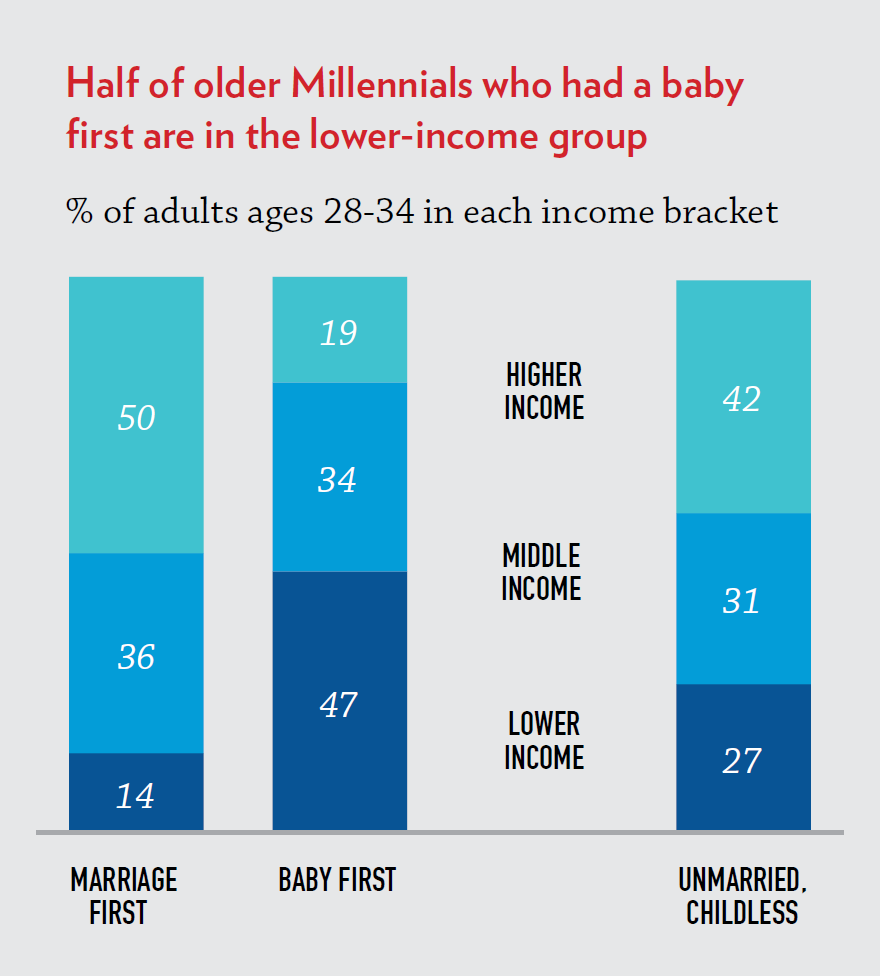“What if large causes of poverty are not matters of material distribution but are behavioral — bad choices and the cultures that produce them? If so, policymakers must rethink their confidence in social salvation through economic abundance.” –George Will
According to a recent report from the U.S. Census Bureau, the values and priorities of young adults are shifting dramatically from those of generations past. As it relates to family in particular, millennials are pursuing a range of nontraditional routes, either delaying marriage and parenthood for the sake of work and education or setting new records for out-of-wedlock childbearing.
While we may be tempted to shrug at such developments, brushing them aside as the predictable “social evolutions” of a modern age, the underlying shifts are bound to have a profound impact on the social and economic health of society. Indeed, they already are.
Back in 2009, the Brookings Institute’s Isabel Sawhill and Ron Haskins proposed what’s become widely known as “the success sequence” — a normative path to middle-class prosperity based on various trends. According to their research, young people were far more likely to avoid poverty if they (1) graduated from high school, (2) worked full-time during their 20s, and (3) waited till they were married to have children (if parenthood was in their future). If you could meet these basic metrics, the odds of escaping poverty would drastically improve.
But are today’s and tomorrow’s young people still bound to such a sequence? Given the more recent shifts in priorities and values — economically, socially, morally, religiously, and otherwise — is such a sequence relevant or applicable?
In short and on the whole, the thesis of Sawhill and Haskins continues to hold, with millennials who follow the “success sequence” continuing to rise faster and easier in the economic ranks, with increasing distinction to their counterparts on “nontraditional” paths:
These divergent paths toward adulthood are associated with markedly different economic fortunes among Millennials. Young adults who put marriage first are more likely to find themselves in the middle or upper third of the income distribution, compared to their peers who have not formed a family and especially compared to their peers who have children before marrying. In other words, even though transitions to adulthood have become much more complex in recent decades, the most financially successful young adults today continue to be those who put marriage before the baby carriage. Fully 86% of young adults who moved into marriage first have family incomes in the middle or top third. (Family income in this report is adjusted for household size and also applies to the incomes of unmarried adults.) In contrast, about half of Millennials who put childbearing first (53%) have incomes in the middle or top third. Young adults who are unmarried and childless fall in between: 73% of them have family incomes in the middle or upper third of the distribution.
In general, Millennials who marry first are more likely to be on track to realizing the American Dream than those who put childbearing first. Moreover, the link between marriage and economic success among Millennials is robust after controlling for a range of background factors… Finally, 97% of Millennials who follow what has been called the “success sequence” — that is, who get at least a high school degree, work, and then marry before having any children, in that order—are not poor by the time they reach their prime young adult years (ages 28-34).
While each of the three categories is uniquely important (work, education, family), Wilcox concludes that a three-pronged reinforcement is definitely at work. In other words, the holistic, sequenced path loses its power and promise the more it gets pieced apart. “Education confers knowledge, skills, access to social networks, and credentials that give today’s young adults a leg up in the labor force,” he writes. “Sustained full-time employment provides not only a basic floor for household income but, in many cases, opportunities for promotions that further boost income. Stable marriage seems to foster economies of scale, income pooling, and greater work effort from men, and to protect adults from the costs of multiple partner fertility and family instability.”
Thus, when it comes to finding ways to spread the subsequent prosperity and cultivate human flourishing , we’d do well to recognize that while there may be a public role or component, the primary drivers require readjustment of our entire moral and economic outlook. “We do not take the view that the success sequence is simply a ‘pull yourselves up by your own bootstraps’ strategy that individuals adopt on their own,” writes Wilcox. “Rather, for many, the ‘success sequence’ does not exist in a cultural vacuum; it’s inculcated by an interlocking cultural array of ideals, norms, expectations, and knowledge.”
As Will reminds us with that initial prod, the drivers of a free and virtuous society are not material, but behavioral — or, at a deeper level, social and spiritual. If millennials hope to build on the successes of ages past, economic or otherwise, we’ll need more than a “sequence-level” adjustment of priorities and mere material allocation. We’ll need a profound shift in our attitudes, outlooks, and moral imaginations.
